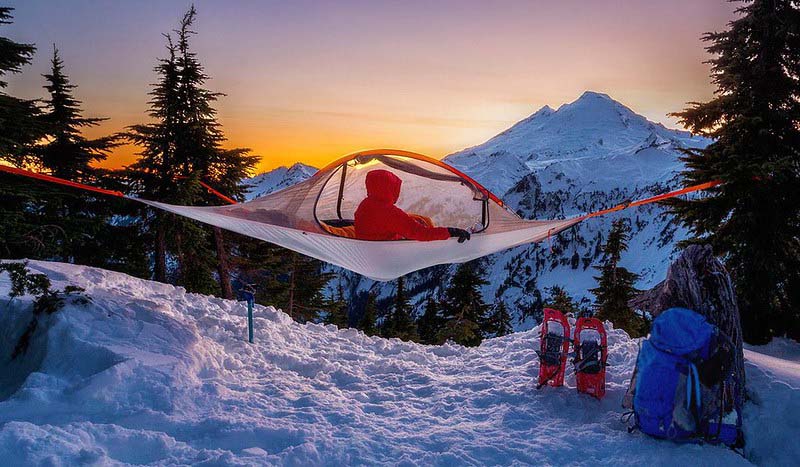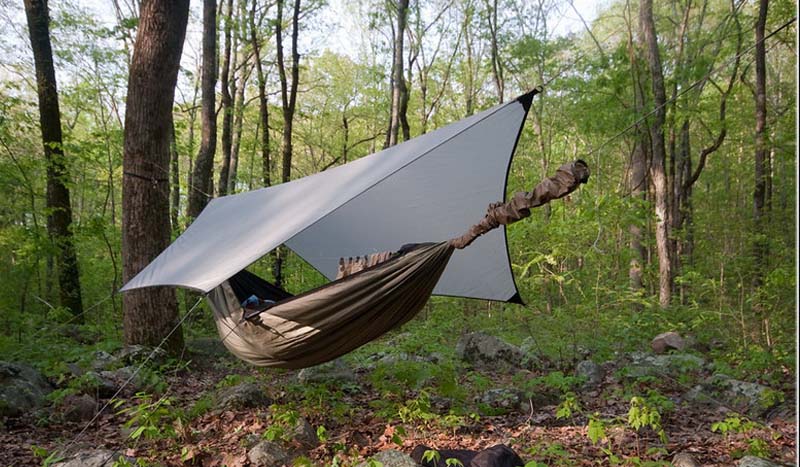Sleeping accommodations for camping can be challenging to figure out, especially if you are new to the camping world. Deciding whether you’ll be sleeping in a hammock or a tent is one of the first things to think about.
If you are adventurous, you can experiment with both options. If you don’t want to test both options out, you can read this article comparing hammock versus tent sleeping and find the best option. Let’s get started!
Practicality
Tents are more practical for long-term stays. Quality tents can stay set up for a long time, provided the campsite allows it. However, hammocks can easily be carried around when you are busy with outdoor activities. When you decide to set up, you just have to find a place to hang them up, and you’ll be good to go.
It’s a great option if you’ll be moving a lot during your camping trip and don’t want to set up and dismantle a tent every time you move. Plus, hammocks provide a wide range of uses. You can bring them to a park, beach, or anywhere else where you plan to spend even a short time outdoors.

Warmth and Protection
When camping in colder climates, many prefer sleeping bags and a tent to keep themselves warm. It also protects from the elements. However, with the appropriate accessories, you can also protect yourself and warm up in a hammock.
For the latter, you’ll need a quilt to protect yourself from heat loss during sleep while the wind is moving underneath the hammock. The market is loaded with warm top quilts and under quilts designed for bundling up in a hammock when camping during cooler months.
While tents offer protection from insects and elements of nature, some hammocks can also be equipped with similar protection. For inclement weather, you can use a waterproof tarp to stay dry. Bug nets can also help you protect yourself from bug bites and other small animals.
Comfort
Hammocks are forever praised for being the most comfortable camping accessories ever invented. This makes sense since you won’t be sleeping on uneven ground, rocks, tree roots, and other above-ground structures, which is a priority for nearly every camper.
Even ground covered in the snow won’t cause any issues with finding a comfy place to sleep. The hammock provides an increased suspension, so you won’t even touch the ground.
The closed-up space in a tent allows for condensation, which also makes it harder to sleep in a humid environment, but you’ll never have this issue with a hammock. The hammock provides a comfortable breeze to cool your body on a hot summer night but can still be insulated for warm for colder adventures.

Size and Weight
Both hammocks and tents come in all shapes and sizes. The variations of both products on the market can be enormous, so you’ll need to ensure you’ve done the proper research before buying an item. The fabrics and the accessories contribute to both the size and the weight of the products. For example, tents require heavy poles for setup, which means they’ll weigh more in your camping bag.
Hammocks use less fabric, which makes them inherently lighter. However, they may include heavy tarps, quilts, tree straps, protection, and other elements, which makes them bulkier and heavier to carry around. Considering what you’ll need and looking for lightweight options can help you reduce the size and weight of the hammock.
Setting Up
Remember that learning to set up a hammock and a tent takes a little practice. You’ll want to know how to suspend your hammock between trees or other structures without damaging these or the material of the hammock.
Practice this by visiting different camping areas where you plan to use the hammock. The correct distance between the structures, the hang angle of the hammock that provides the most comfort and stability, and the knots you use are just some of the factors you need to pay attention to.
Likewise, you should also practice setting up the tent, which can be even harder. While with a hammock, there is a bit of ingenuity to be applied, tens have more details to figure out. It’s also harder to find spots to set up and secure a tent due to the uneven terrain and other environmental conditions.
Possible Limitations
No product comes without limitation, and tents and hammocks are no exception to this rule. The inability to set up either of these structures is a great limitation. This can happen either due to poor knowledge, faulty materials, or restrictions posed by campsites. Some parks and campgrounds ban using hammocks, while others restrict setting up tents.
Some popular camping sites have designated spaces to hang up your hammock and ban them from any other locations. Learning about these when planning your trip will help you avoid any issues. Not having additional gear to keep you comfortable and safe may also become a limitation. Bringing a hammock leaves more room for other equipment than carrying a tent does.

Price
While material quality will definitely affect the prizes of both tent setups and hammock setups, the latter will always be less expensive. The costs of a hammock depend on what additional gear you need to carry around, but you’ll still have to buy a few pieces of equipment.
This means less material, which translates to a lower price, regardless of the quality. In fact, investing in a high-quality hammock could provide you with a far better experience than buying a tent for the same price.
That said, it’s all about prioritizing the necessary items you’ll carry. If you need amenities better suited for a tent, you’ll probably get a tent for sleeping. Some of them come with plenty of additional equipment, and you’ll always find great deals on these items.
Final Thoughts
As you can see, both sleeping in a hammock and a tent has unique perks outdoor enthusiasts will appreciate. There are, however, considerable differences between the equipment you’ll need to set them up and the comfort and protection level you provide.
While hammocks seem to tip the scale in their direction in most points examined in this article, which option you choose depends on your preferences. Campers who don’t mind sleeping on uneven ground will typically choose tents, while those who value comfort will opt for sleeping in a hammock.
